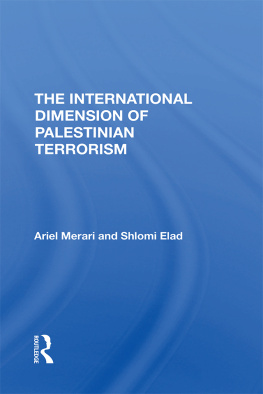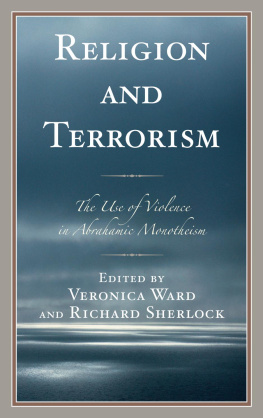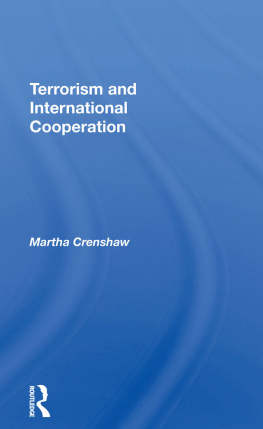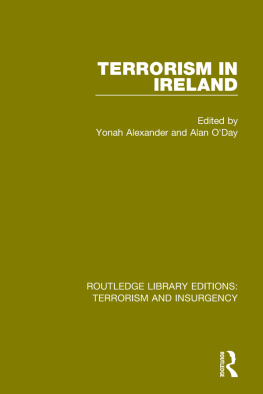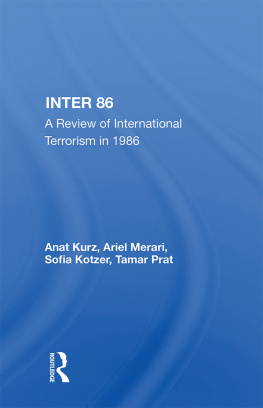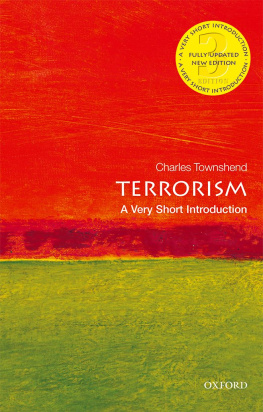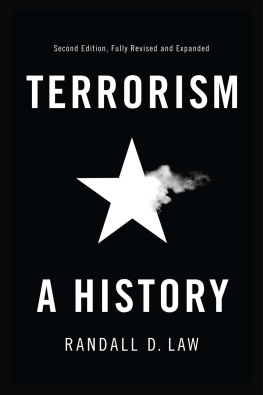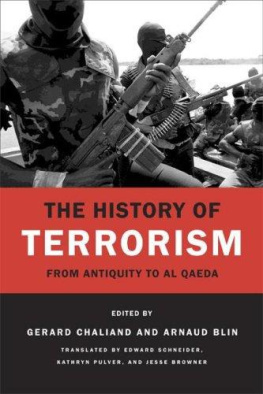JCSS Study no. 6
The International Dimension of Palestinian Terrorism
Ariel Merari and Shlomi Elad
First published 1986 by Westview Press
Published 2019 by Routledge
52 Vanderbilt Avenue, New York, NY 10017
2 Park Square, Milton Park, Abingdon, Oxon OX14 4RN
Routledge is an imprint of the Taylor & Francis Group, an informa business
Copyright 1986 Tel Aviv University Jaffee Center for Strategic Studies
All rights reserved. No part of this book may be reprinted or reproduced or utilised in any form or by any electronic, mechanical, or other means, now known or hereafter invented, including photocopying and recording, or in any information storage or retrieval system, without permission in writing from the publishers.
Notice:
Product or corporate names may be trademarks or registered trademarks, and are used only for identification and explanation without intent to infringe.
ISBN 13: 978-0-367-29314-7 (hbk)
Terrorism, by its very nature, is a dynamic and rapidly changing phenomenon. This is particularly true of Palestinian terrorism: it is pluralistic in composition, flourishes in a highly volatile region, and is affected by numerous external actors and elements. Hence any attempt to produce research on Palestinian terrorism of a completely up-to-date nature is doomed to failure. The production of such a work cannot possibly keep up with the pace of events. Further, as these lines are written the Palestinian terrorist organizations are going through one of the most stormy periods since their founding: the resultant shockwaves affect not only political and strategic developments in the Middle East, but, in particular, the specific topic of this work: international Palestinian terrorism.
Most of the work on this study was completed by the fall of 1985, and the statistics presented generally cover the period 1968-1984. But 1985 and the first half of 1986 were characterized by intensive terrorist activity, and by events whose projected ramifications went far beyond the short term, such as the collapse of the Jordan-PLO rapprochement, the American Middle East peace initiative, the reexpulsion of the PLO from Jordan and the additional schism within its ranks, and the American bombing of Libya in reprisal for that state's involvement in international terrorism. In order to cover this critical period in Palestinian international terrorist activity, and to assess the background factors, an epilogue has been appended to this study. Obviously, such an essay in updating suffers from all the drawbacks of contemporary history. At best we can hope to present a precise review of the facts, and to distinguish between significant and insignificant events and developments. The overall significance of these events for the future remains a matter of speculation.
Many people have assisted in the writing and editing of this study. Particularly, Major Danny Laish of the IDF Spokesman's office provided extensive data on Palestinian terrorist attacks; the research staff of the Jaffee Center for Strategic Studies ran the drafts of this work through a highly exacting critical process, and offered suggestions for improvements; and Miriam Cassuto word-processed the entire manuscript. The professionalism, patience and positive approach of Joseph Alpher, Deputy Head of JCSS and editor of its research publications, were critical in bringing this study to print. Finally, a special thanks to Tamar Prath and Anat Kurz, who helped with advice, criticism and organization of the data of recent years.
Ariel Merari
Fall, 1986
One of the assessments to emerge in the wake of the 1982 Lebanon War was that the shattering of the PLO infrastructure in Lebanon would precipitate changes in its pattern of activity against Israel. One possibility to be mooted in this regard was a large scale renewal of terrorist actions against Israeli and Jewish targets outside of Israel, and possibly against countries which provided Israel with support and assistance.
In all of these calculations, the precedent of the events of "Black September" of 1970 the expulsion of the PLO from Jordan played a significant role. It was postulated that a renewal of Palestinian terrorism outside of Israel might be on the same intensive scale of the Black September period from late 1971 until early 1974 or on that of the 1968-70 period, when the Popular Front for the Liberation of Palestine was in its heyday.
The Lebanon War of 1982 dealt a serious blow to the PLO in Lebanon, particularly insofar as its capacity for direct action against Israel was concerned. Terrorism across the border (in the form of rocket attacks and commando infiltration) became almost impossible as terrorist concentrations were pushed northward by advancing IDF forces, and as other Arab states refused the organizations access to their own borders with Israel. By the same token, the destruction of the terrorist logistical infrastructure in Lebanon resulted in a depletion of arms supplies and sabotage material, compromised command and control networks and provided the IDF with an intelligence windfall in the form of captured documents all seriously undermining the PLO's potential to organize renewed attacks within Israel.
At the same time, overall PLO morale suffered a serious blow, particularly in the wake of the evacuation from Beirut in September 1982. Not only had the organization suffered a major military defeat, but as a direct consequence of that defeat its forces were dispersed throughout the Arab hinterland from Tunisia to South Yemen and there placed in the humiliating position of being "unemployed" and of having to depend on the charity of the host countries.
Even before the war in Lebanon, radical elements within the PLO had opposed the organization's official line and insisted on the renewal of activity outside of Israelwhich had officially ceased in 1974. Against this backdrop, the altered circumstances in Lebanon gave added impetus to an assessment that the organization would change its policy of refraining from activity abroad.
Yet from mid-1982 until mid-1985 there were no distinctive shifts in terrorist activity outside of Israel. Most of the Palestinian terrorist incidents in 1983-1984 were directed against Arab, rather than Israeli/Jewish targets. One possible reason for this phenomenon was the time needed for the reestablishment of a logistical and operative infrastructure for implementing operations outside the base state. True, the Palestinian organizations had always maintained a permanent infrastructure abroad, despite the decrease in the scope of their activity. But an intensive terrorist campaign requires specific deployment, including the recruitment or training of operatives with characteristics necessarily different from those of regular fighters, the smuggling of arms to target countries, and the collecting of intelligence on intended targets. For example, it took the Fatah about a year after the events of Black September 1970 before the organization bearing that name staged its first operation (the assassination of the Jordanian prime minister in Cairo in November 1971).
Another explanation for the fact that Palestinian terrorism outside of Israel had not been fully renewed prior to mid-1985, involves the changes wrought by the Lebanon War and its aftermath in the internal balance of the organizations comprising the PLO. These were most apparent in Fatah, where a rebellion erupted against Arafat's leadership. In December 1983, following fighting in Tripoli between the Fatah rebels and those Fatah forces loyal to Arafat, the loyalists had to evacuate the city. This internal organizational instability did not facilitate any sort of decision-making within the PLO regarding a radical change in strategy; no doubt it also affected the ability to prepare the necessary infrastructure and to plan and execute operations.

